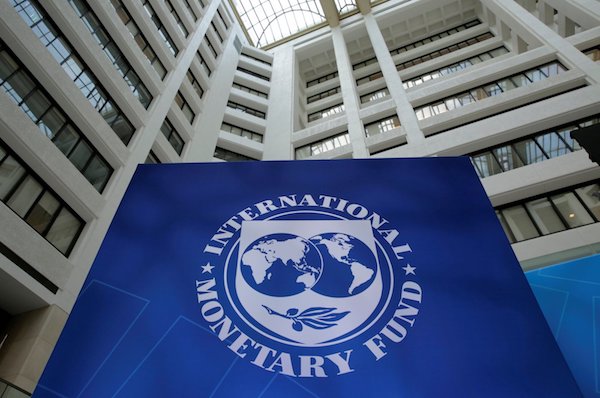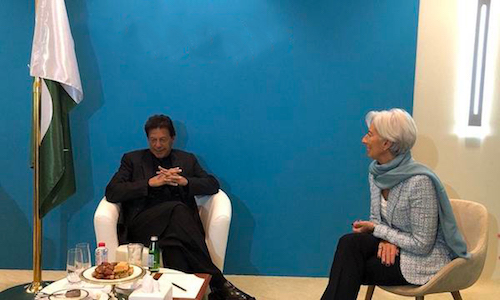had aspired for a US$ 12 billion bailout package from the International Monetary Fund (IMF), it got only 50 percent. And out of this US$ 5.8 billion will shortly be recycled to IMF as repayment of its earlier loans. Pakistan’s economic managers will have hard time prioritizing the usage of remaining US$200 million! Technically one may say, IMF has given the bailout package to itself for recovering its own loans from Pakistan.
Pakistan’s negotiations with (IMF) for the 22nd programme were perhaps the toughest. There were multiple reasons for this: PM Imran Khans’ anti-IMF rhetoric spanning over two decades, Pakistan’s policy differences with the US over CPEC and Afghanistan and Pakistan’s China policy that runs counter to America’s outright ‘Contain China’ trajectory. The voting pattern of IMF gives maximum voting weightage to the US. With these odds against Pakistan the Fund is by and large signing on its own conditions.
The staff-level agreement now awaits a formal approval by the IMF board of directors in Washington. “The Pakistani authorities and the IMF team have reached a staff level agreement on economic policies that could be supported by a 39-month Extended Fund Arrangement (EFF) for about US $6 billion,” an IMF press release quoted IMF Mission Chief for Pakistan Ernesto Ramirez Rigo as saying. This agreement would open up at $2-3bn in additional financing from the World Bank and the Asian Development Bank.
Pakistan’s economy has been struggling since last year with spiraling current account and fiscal deficits, alongside steepening inflation in the last three months. Foreign loans have exceeded $90bn and exports have registered a negative growth over the past five years. In March the State Bank revised its GDP growth target down to a sluggish 3.5 percent from the original target of around six percent. According to the country’s Bureau of Statistics, in April the Consumer Price Inflation (CPI) stood at 8.8 percent, up from roughly 3.8 percent at the same time last year.
The State Bank data shows a tightening of monetary policy, with interest rates raised to 12.25 percent in May. There has seen some import substitution and slowing of demand, with the trade deficit dropping by 13.1 percent to roughly $26.2bn in the first 10 months of the fiscal year.
The agreement is subject to timely implementation of prior actions: market based exchange rate, constant recovery in the energy sector and fiscal consolidation to reach primary deficit of 0.6 percent of GDP in FY20. The IMF said the programme of structural reforms will target increasing government revenues and reducing spending, bringing down the primary fiscal deficit, which excludes development spending, to 0.6 percent of the GDP in the upcoming budget. The programme will include “tax policy revenue mobilization measures to eliminate exemptions, curtail special treatments, and improve tax administration”. It will also target Pakistan’s loss-making state-owned enterprises and the country’s energy sector, long plagued by structural issues that have led to a burden of heavy subsidies on the government. On discount rate IMF has not said anything explicitly.
The IMF programme is implied to be signed after the presentation of the budget and revision in energy prices. “Pakistan is facing a challenging economic environment, with lackluster growth, elevated inflation, high indebtedness, and a weak external position,” said Rigo, “This reflects the legacy of uneven and procyclical economic policies in recent years aiming to boost growth, but at the expense of rising vulnerabilities and lingering structural and institutional weaknesses”, he added.
The IMF is a UN parented organization of 189 countries working to foster global monetary cooperation, secure financial stability, facilitate international trade, promote high employment and sustainable economic growth, and reduce poverty around the world. Created in 1945 the IMF is governed by and accountable to the 189 countries that make up its near-global membership.
Unlike the General Assembly of the UN, where each country has one vote, decision making at the IMF was designed to reflect the relative positions of its member countries in the global economy. The IMF provides loans to member countries experiencing actual or potential balance of payments problems to help them rebuild their international reserves, stabilize their currencies, continue paying for imports, and restore conditions for strong economic growth, while correcting underlying problems. The IMF works with governments around the world to modernize their economic policies and institutions, and train their people. This helps countries strengthen their economy, improve growth and create jobs. The maximum amount it could lend is US$ 1 trillion.

Notwithstanding the rumors and composition of IMF imposed team of economic managers, Pakistan is not likely to go the Egyptian way. Assuming steep adjustment in currency may not be a pre-condition, but parity could depreciate the Rupee once the inflation creeps up after new taxes.
Energy and fiscal matters had retarded progress on package negotiations for many months. Nothing was done in the past nine months to show IMF that Pakistan has any other plan to bring energy subsidies down or to lower fiscal deficit without simply increasing tariff and imposing new taxes.
Now, a new amnesty scheme has been launched, it will be interesting to see the public response, and its impact on reducing fiscal deficit that has reached 2.2 percent of GDP. It was 0.3 percent when Pakistan exited the last IMF programme in 2016. Deficit is expected to touch 2.8-3.0 percent of GDP in FY19. Reverse paddling it to 0.6 percent of GDP in one year is a daunting task requiring mobilization of additional revenues or slashing the expenditure by Rs800-1,000 billion. Such measures would be budgeted in the form of revenue enhancement. Will the existing corrupt and coercion base tax collection system be able to achieve this target is the billion dollar question.
Moreover additional taxes will induce further inflation and hence interest rate may further soar. This would necessitate further devaluation. Hence a vicious cycle would set in. A large trade deficit has already prompted authorities to devalue Rupee by 24 percent during the last year. However, direct impact on Consumer Price Index (CPI) would not be massive, as 78 percent of domestic sector is insulated from the proposed tariff increase. The Government still has kept room for higher electricity subsidies. Privatization proceeds may be envisaged to fill the revenue gap.
“There are two legs on which every IMF programme walks: the macroeconomic adjustments of getting the currency and deficits right, and the other is the structural transformation of the economy, which targets state-owned enterprises, improving competitiveness and other steps,” Khurram Husain, business editor at Pakistan’s Dawn newspaper, told Al Jazeera. “Pakistan has had a good track record of doing rudimentary macroeconomic adjustments, but it never gets quite beyond that”, he added. Husain said the programme would extract a steep cost in the short term, as reforms were being put in place. Stock market analysts said the bailout announcement would ease investor concerns by bringing an end to uncertainty around the IMF’s programme. “The IMF agreement will provide the much-needed confidence to both local and foreign investors in Pakistan as it will remove nine-month uncertainty on IMF funding,” said Muhammad Suhail, CEO of Karachi-based Topline Securities.
Pakistan has had an uneasy relationship with the lending body and nationalist politicians often characterize it as a tool of American dominance. Like most of such programmes, this bailout package also triggered a controversy at domestic political plane. An opposition senator commented: “We disapprove of the anti-people deal this govt has signed with the IMF without disclosing its terms before the parliament. It will pave the way for more inflation and rupee devaluation.” And, Adviser to PM on Finance is trying to sell it as pathway to heavens for a common Pakistani.
When in power, Pakistani politicians die for securing IMF bailout packages and when in opposition they project IMF loans as poison for national development. Prime Minister Imran Khan was a vociferous critic of the IMF and before taking up office, he had vowed not to turn to it for assistance. By structuring a tough package, IMF has apparently settled its personal score with him. Some analysts had warned that any fresh IMF injection could harm Prime Minister Imran Khan’s pledges to build a welfare state. When this programme ends, Pakistan would be under tremendous pressure as return of good-will interest free cash placements from China, Saudi Arabia and the UAE would also be due. It would be an interesting thing to postulate as to whether Pakistan would be better or worse off when this programme expires.




